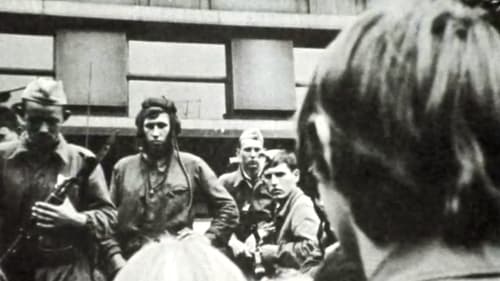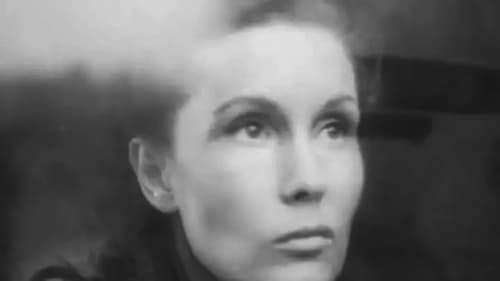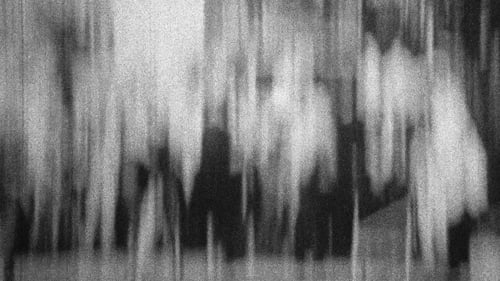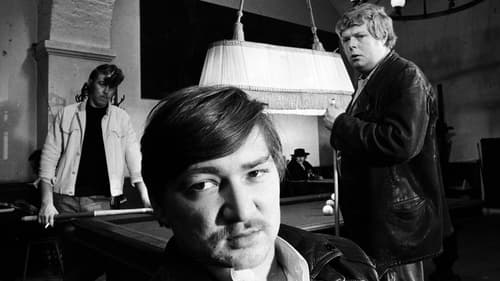Adventures of Jimmy (1951)
Gênero :
Runtime : 12M
Director : James Broughton
Sinopse
'Adventures of Jimmy' resolves its immature hero’s quest for “playmates” through a tongue-in-cheek narration that juxtaposes ironically with the images. We are told his family left him their whole estate, as we see a shack in the woods. The happy resolution is a joke on monogamy. It’s a straightforward story, the work of someone who wants to entertain with elegance and quiet subversion.

To the toccata portion of Bach's "Toccata and fugue in D minor," we watch a play of sorts. Blue smoke forms a background; a grid of black lines is the foreground. Behind the lines, a triangle appears, then patterns of multiple triangles. Their movements reflect the music's rhythm. Behind the barrier of the black lines, the triangle moves, jumps, and takes on multiple shapes. In contrast with the blue and the black, the triangles are warm: orange, red, yellow. The black lines bend, swirl into a vortex, then disappear. The triangle pulsates and a set of many of them rises.

Jay De Feo started painting THE WHITE ROSE in 1957. When the unfinished painting was removed eight years later it weighed over 2300 pounds.

Long considered lost, The Assignation was Curtis Harrington's first color film. It was shot in Venice, Italy, and follows a masked figure through the labyrinthine canals of the city, building to a spectacular climax.

Experimental documentary film, set in the then-present day, about an impoverished, lost boy, living alone in the Bowery.

Stock footage edited with music to comment on American culture.

In a European seaside village, a maiden takes clean sheets down from the clothesline. Carrying her basket of linens home, she stops to consult a fortune teller. The cartomancienne sees love in the cards. The young woman pauses to reflect. We then see water, swirling, and into view swims a man, as if just appearing on earth. He arrives on shore - is he just in her mind's eye, or is he real? She weaves a garland for her hair. Will they meet?

“Riggs’s film poem conveys delight with his adopted hometown through a documentarian’s eye for significant detail, a lyrical sensitivity, and homespun humor. The film, too, serves as a chronicle of people and places of Santa Fe in the early 1930s, when it earned the epithet ‘Greenwich Village of the West.’” - William M. Butler

Two reels of mis-takes in shooting Part II of 3RD DEGREE. Film was loaded in camera improperly and the image slides about off-center and becomes blurred – creating some rather amusing and mysterious imagery. A made “found” object. —ubu.com

This dazzling stop-motion animation provided Vorkapich with a forum to demonstrate complex perceptual theories related to the persistence of vision and phi phenomenon. The dance of objects and their movements before the camera lens–somewhat similar to Oskar Fischinger’s abstractions–illustrate many visual sensations playfully executed by Vorkapich.

Depois da Segunda Guerra Mundial, um grupo de partizans vem ter com uma família burguesa para os ensinar a cantar e a declamar novas músicas. A família logo se esquece de seus antigos costumes e princípios.

Filmed clandestinely in Czechoslovakia on 16mm. It's one of the films Godard made with the Groupe Dziga Vertov - a Marxist film about the political situation after the '68 revolution.

A woman waits for her husband, a woodcutter, during long lonely days. She becomes weary and leaves him to live with her sister. He takes the news with a look of resignation, but the next day she returns to wait for him again.

Collage of dramatic scenes, some exaggerated to comic effect, with asynchronous sound from well known classic, operatic, and rock and roll music – with different approaches to love, suffering, and death.

A surrealistic nightmare inspired by an 1855 photographic portrait, in which the magic tricks of early cinema are used to eerie effect. Creepy and beautiful at the same time, it does not share platitudinous ways to frighten the audience with the vast majority of modern horrors. Countess di Castiglione is a really existed Italian courtesan famous for her beauty and wide acquaintanceship among the ruling elite of those times. She directed Pierre-Louis Pierson to help her create 700 different photographs in which she re-created the signature moments of her life for the camera. Robert de Montesquiou, a Symbolist poet, dandy, and avid art collector, was fascinated by the Countess di Castiglione. He spent thirteen years writing a biography, La Divine Comtesse, which appeared in 1913. After her death, he collected 433 of her photographs, all of which entered the collection of the Metropolitan Museum of Art.

This live-action short subject commissioned for the 75th birthday of German romantic composer Robert Schumann juxtaposes flowing water imagery with the piano playing of artist Nina Hanson.

Multi-faceted artist Phil Niblock captures a brief moment of an interstellar communication by the Arkestra in their prime. Black turns white in a so-called negative post-process, while Niblock's camera focuses on microscopic details of hands, bodies and instruments. A brilliant tribute to the Sun King by another brilliant supra-planetary sovereign. (Eye of Sound)

An experimental feature made by rephotographing the 1905 Biograph short Tom, Tom, the Piper's Son.

A poetic ode to the River Seine, Ivens' distinguished camera eye surveys its lively banks and step-stone canals with a vérité candor, a beguiling elan.

A documentary portrait shot in Positano, Italy in 1965 about Australian artist and occultist Vali Myers.

Ricky returns to Munich from Vietnam and is promptly hired as a contract killer.





